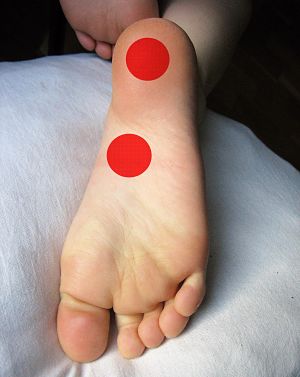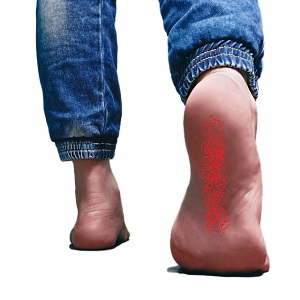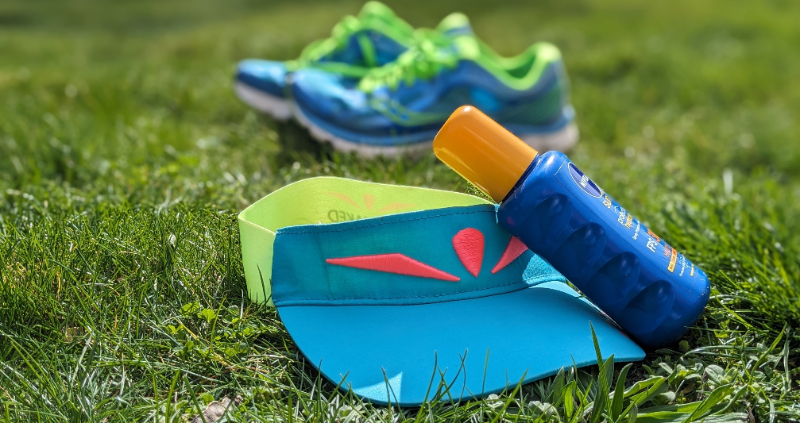What is Plantar Fasciitis
 Plantar Fasciitis points of pain
Plantar Fasciitis points of painWhat is Plantar Fasciitis? Plantar fasciitis is a pretty common running injury -pronounced Plan-ter Fash-ee-eye-tus.
What is Plantar Fasciitis
Signs & Symptoms
How Plantar Fasciitis Progresses
Causes
Home Treatments for Plantar Fasciitis
How Long does Plantar Fasciitis last
Getting Back to Running
What is Plantar Fasciitis?
Plantar fasciitis is an inflammation of the plantar fascia ligament.
The plantar fascia ligament is a flat band of tissue that runs along the underside of the foot and it connects the heel bone to the toes. It also provides support to the arch of the foot and helps protect the sole.
It is usually caused by a repetitive strain injury to the plantar fascia. It could be due to too much running or walking, inappropriate footwear or a jumping injury whereby you strain the ligament as you land.
Any part of the plantar fascia can get damaged but the most common part to suffer is the heel area. The damaged plantar fascia gets over stretched and develops tiny micro tears which lead to inflammation and pain in your foot.
Signs that you may have Plantar Fasciitis
The first thing you will experience is pain in the sole of your foot, usually towards your heel. It might start as a slight burning pain but then progresses to a sort of stabbing pain or it feels like you have trodden on a sharp object.
Some people have heel pain whilst others have pain in the arch of their foot or even both. The pain is worse first thing in the morning when you take your first steps out of bed.
When walking of running, the pain is there to begin with, then might ease a bit once you have warmed up your ligaments and tendons. However if you are on your feet for a long time then the pain usually comes back.
----- What is plantar fasciitis -----
How Plantar Fasciitis Progresses
Plantar fasciitis usually progresses gradually.
Once the plantar fascia gets over-stretched and inflamed, the inflammation may then progress to micro tears in the plantar fascia. As the inflammation progresses, so does the pain which will be more noticeable first thing in the morning and at the end of the day.
Eventually the pain is there with every step and it can be quite severe. A cycle sets up whereby the plantar fascia stiffens overnight and then as you take your first morning steps, new micro tears develop. And so the pain continues.
In some cases, heel spurs can also develop. When the plantar fascia is subject to over tension for a long period of time, it pulls on the heel bone (the area where it joins the heel) and the body reacts by laying down extra bits of bone growth. These bits of bone are known as heel spurs. They can be quite sharp and are pretty uncomfortable when walking.
----- What is plantar fasciitis -----
Possible Causes of Plantar Fasciitis in Runners
Although anyone can get plantar fasciitis, runners are particularly susceptible. Common causes among runners are:
- Dramatic increase in running mileage
- Sudden increase in speed work
- New running shoes which are very different from your previous shoes
- Starring barefoot or minimalist shoe running
- Tight calf muscles.
- Poor range of motion in your ankle.
- Walking bare foot or in hard, flat shoes, when you are not used to it.
- Possible poor arch support in your running shoes.
----- What is plantar fasciitis -----
Best Home Treatments for Plantar Fasciitis
As much as we runners hate to hear it, your best bet to heal your plantar fascia quickly is to take some days off running, even if the pain is not that bad.
If you are feeling sorry for yourself, cheer up, as 90% of cases of plantar fasciitis can be cured with simple home remedies.
How long does Plantar Fasciitis last?
How long it lasts depends on how quickly you nipped it in the bud and whether you have been able to identify the cause.
The good news is that for most people, plantar fasciitis will clear itself up within a few weeks.
If the pain continues after a month or is very severe then you should see a doctor as you may have heel spurs or another condition that might need medical treatment.
----- What is plantar fasciitis -----
Getting back to running
Make sure that you've worked out what the cause of you plantar fasciitis is and aim to sort that out.
After taking a couple of days off and if your pain is not getting worse, try a very easy ten minute run on the flat.
If there is a bit of soreness which doesn't worsen or hasn't got worse at the end of the day, great. You can keep running but increase your mileage and pace very gradually over a couple of weeks. Also, keep doing the home treatments above.
If however you find that you have to alter your gait or that you start limping or the pain is getting worse in the morning or during the day, then you need to take more time off (sorry!).
----- What is plantar fasciitis -----



